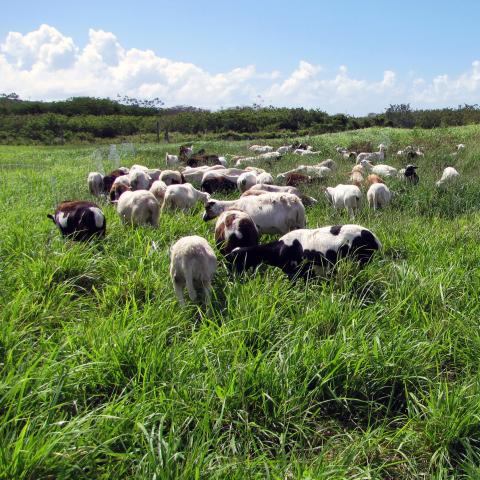
Press Release
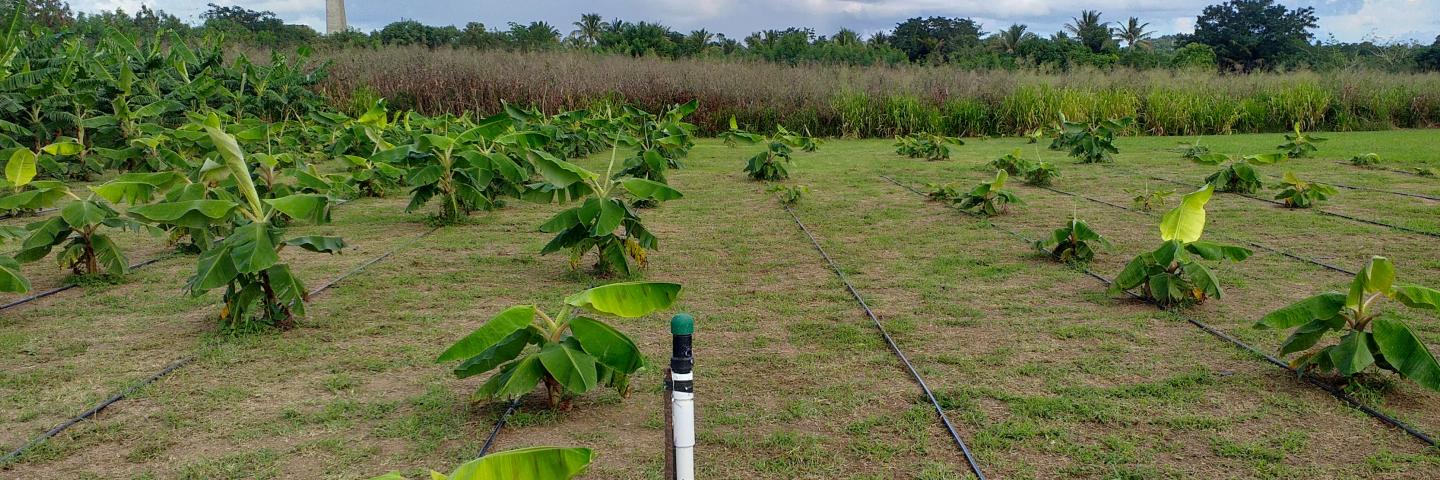
From weather to pests, Puerto Rico & U.S. Virgin Islands farmers face a unique set of challenges. The Environmental Quality Incentives Program provides financial and technical assistance to farmers and forest landowners in to address natural resource concerns and deliver environmental benefits.

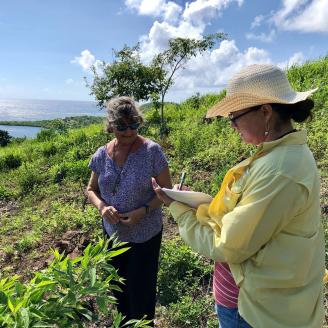
EQIP applications are accepted on a continuous basis, however, NRCS establishes application "cut-off" or submission deadline dates to evaluate, rank and approve eligible applications. EQIP is open to all eligible farmers and submitted applications may be considered or evaluated in multiple funding pool opportunities. Contact your local NRCS office for more information.
The Environmental Quality Incentives Program (EQIP) provides financial and technical assistance to agricultural and forestry producers in Puerto Rico and the U.S. Virgin Islands (USVI) to address natural resource concerns and deliver environmental benefits such as improved water and air quality, conserved ground and surface water, reduced soil erosion and sedimentation, and improved or created wildlife habitat.
This voluntary conservation programs helps producers make conservation work for them. Together, NRCS and producers invest in solutions that conserve natural resources for the future while also improving agricultural operations.
Through EQIP, NRCS provides agricultural producers and non-industrial forest managers with financial resources and one-on-one help to plan and implement conservation practices. Using these practices can lead to cleaner water and air, healthier soil and better wildlife habitat, all while improving agricultural operations. Through EQIP, you can voluntarily implement conservation practices, and NRCS co-invests in these practices with you.

Through EQIP, NRCS provides farmers with financial resources and one-on-one help to plan and implement conservation practices. Using these practices can lead to cleaner water and air, healthier soil and better wildlife habitat, all while improving agricultural operations. Through EQIP, you can voluntarily implement conservation practices, and NRCS co-invests in these practices with you. Some benefits include:
Conservation Incentive Contracts (CIC) are a new option under EQIP, with a focus on Drought Resilience management practices. EQIP-CIC provides financial assistance to adopt conservation activities on working landscapes. Through five to 10-year contracts, farmers manage, maintain and address important natural resource concerns and build on existing conservation efforts.
Targeted EQIP financial assistance is available through several programmatic and landscape conservation initiatives.
Landscape Conservation Initiatives address priority natural resource concerns on the most vulnerable lands, target conservation assistance in high priority watersheds, or help stimulate the development and adoption of innovation and technology. Learn about Landscape Conservation Initiatives here.
Historically underserved (HU) participants are eligible for advance payments to help offset costs related to purchasing materials or contracting services through EQIP. HU participants may elect to receive an advance of not less than 50 percent of the EQIP conservation practice payment amount. Participants who receive an advance payment must expend the funds within 90 days of receiving the advance.
The best way to learn if EQIP is a good fit for you is by contacting your local NRCS office. If you choose to move forward, your local NRCS conservationist will guide you through applying for the program. Applications are ranked, and if yours is funded, NRCS will offer you an EQIP contract to receive financial assistance for the cost of implementing practices. Payment rates for conservation practices are reviewed and set each fiscal year.
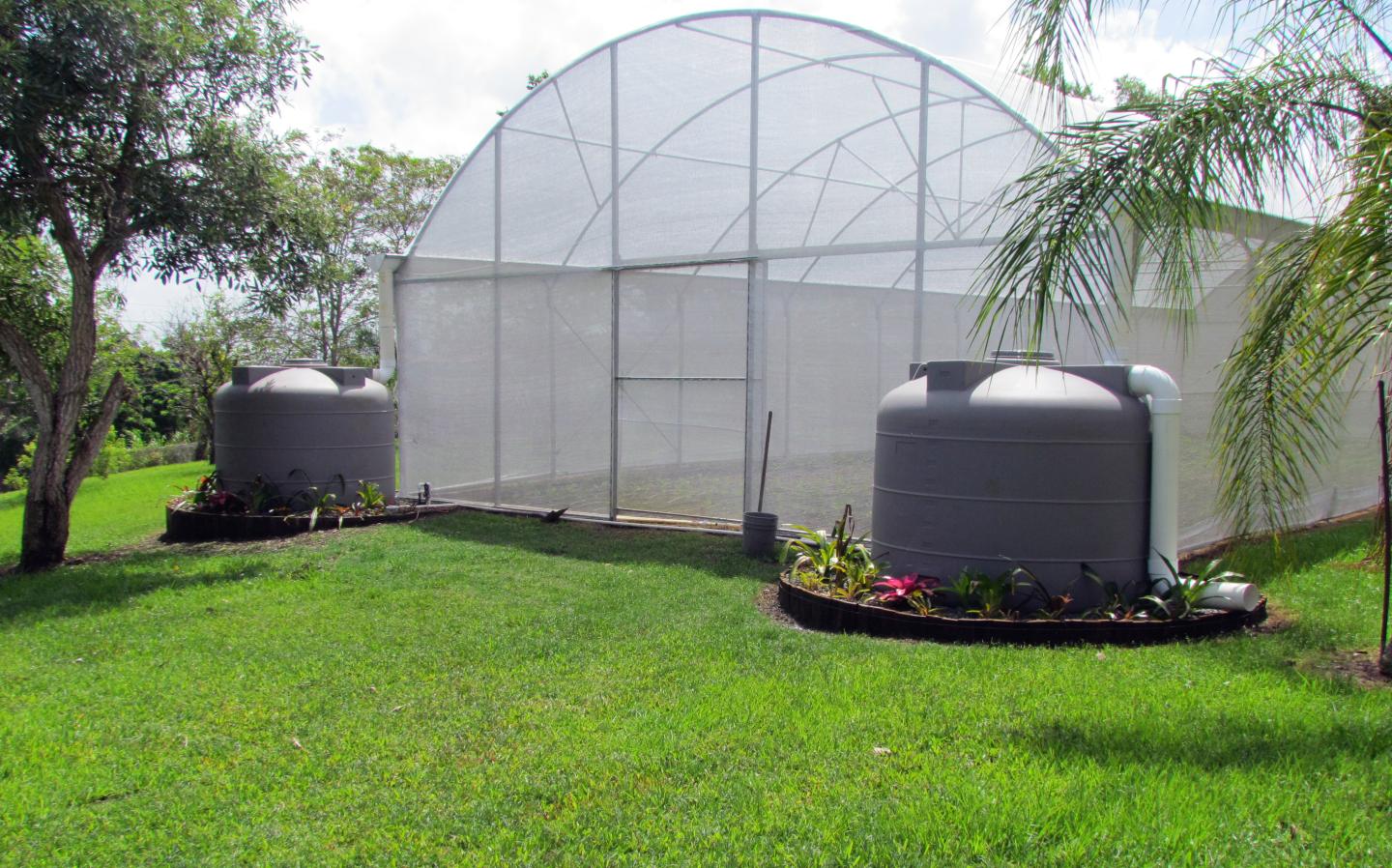
Extend your growing season and protect crops from sun and wind with a High Tunnel.
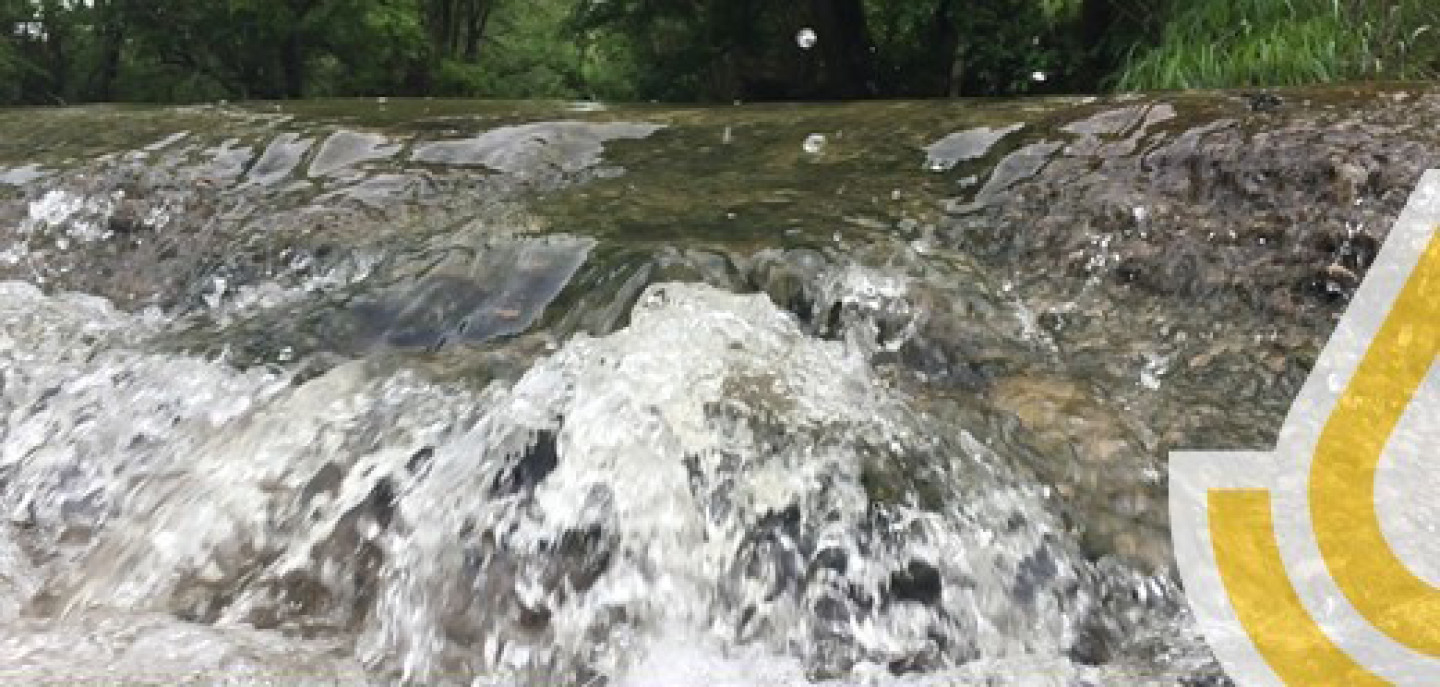
Apply conservation and management practices through a systems approach to control and trap sediment, nutrients and organic runoff to improve water quality and aquatic habitats.
The first cut-off date for the NRCS Caribbean Area fiscal year 2025 sign up period for the Environmental Quality Incentives Program (EQIP) is November 29, 2024.
The Environmental Quality Incentives Program helps farmers and ranchers improve and protect environmental quality on their land by offering financial and technical assistance to voluntarily implement conservation practices. In FY 2022, 238 farmers in the Caribbean Area signed up over 8,000 acres of farmland in EQIP contracts for over $12.7 million.
EQIP applications are accepted on a continuous basis, however, NRCS establishes application "cut-off" or submission deadline dates to evaluate, rank and approve eligible applications. EQIP is open to all eligible agricultural producers and submitted applications may be considered or evaluated in multiple funding pool opportunities.
Below are the FY 2025 EQIP ranking criteria and questions for NRCS programs in the Caribbean Area by funding pool:
Desde el clima hasta las plagas, los agricultores del Área del Caribe se enfrentan a un conjunto único de desafíos. El Programa de Incentivos a la Calidad Ambiental (EQIP, por sus siglas en inglés) proporciona asistencia financiera y técnica a los productores agrícolas y forestales de Puerto Rico e Islas Vírgenes Americanas (USVI, por sus siglas en inglés) para atender las preocupaciones de los recursos naturales y ofrecer beneficios ambientales, tales como mejoras a la calidad del agua y el aire, conservación de aguas subterráneas y superficiales, reducción de erosión y sedimentación del suelo, y mejoras o desarrollo de hábitat para la vida silvestre.

A través de EQIP, NRCS proporciona a los agricultores recursos financieros y ayuda directa para planificar e implementar mejoras, através de la instalación de prácticas de conservación. El uso de estas prácticas puede resultar en un agua y aire más limpio, suelo más saludable y un mejor hábitat para la vida silvestre, todo mientras se mejoran su operación agrícola. A través de EQIP, el agricultor puede implementar voluntariamente prácticas de conservación, y NRCS co-invierte en estas prácticas junto a usted.
Los Contractos de Incentivos para la Conservación (CIC, por sus siglas en inglés) son una nuevo opción bajo EQIP y las prácticas de manejo de la resiliencia a la sequía. EQIP-CIC brinda asistencia financiera para adoptar actividades de conservación en tierras agrícolas. A través de contratos de cinco a 10 años, los agricultores administran, mantienen y abordan importantes problemas de recursos naturales y se basan en los esfuerzos de conservación existentes. Descargue nuestra para más detalles. La fecha límite para solicitar bajo el año fiscal 2025 EQIP-CIC es el 29 de noviembre de 2024.
Los productores agrícolas y los propietarios de tierras forestales no industriales y tribus son elegibles para solicitar EQIP. La tierra elegible incluye tierras de cultivo, pastizales, tierras forestales privadas no industriales y otras tierras agrícolas o ganaderas.
Los solicitantes deben:
Restricciones y requisitos del programa adicionales pudieran aplicar.
Los productores históricamente desventajados (agricultores/ganaderos de recursos limitados, agricultores/ganaderos principiantes, productores socialmente desventajados, tribus y veteranos) pueden ser elegibles para tasas de pago más altas para ayudarles a implementar planes y prácticas de conservación.
Los productores históricamente desventajados también son elegibles para pagos adelantados de hasta el 50 por ciento del costo necesario para comprar materiales o contratar servicios para comenzar la instalación de prácticas de conservación aprobadas. Los productores históricamente desventajados pueden encontrar definiciones para cada categoría e información adicional aquí.
La mejor manera de saber si EQIP es una buena alternativa para usted es contactando su oficina local de NRCS. Si decide seguir adelante, su conservacionista local lo guiará a través del proceso de solicitud para dicho programa. Las solicitudes son clasificadas, y si la suya es seleccionada para fondos, NRCS le ofrecerá un contrato de EQIP para recibir asistencia financiera por el costo de implementar las prácticas. Las tasas de pago para las prácticas de conservación se revisan y establecen cada año fiscal.
La lista de prácticas elegibles en el Área del Caribe, las tasas y límites de pago, los recursos elegibles y los criterios de puntuación estatal se desarrollan basados en el insumo y recomendaciones del Comité Técnico Estatal (STC, por sus siglas en ingles). El STC está compuesto por representantes de varios agro-negocios, grupos de productores, organizaciones de conservación y representantes de agencias gubernamentales federales, estatales y tribales.
Las prioridades a nivel local se basan en las aportaciones de los grupos de trabajo locales (LWG, por sus siglas en ingles) que proporcionan comentarios a cada oficina de campo.
Las prioridades establecidas a nivel estatal y local son las que el STC y LWG respectivamente determinaron eran las de mayor necesidad y tendrían el mayor impacto ambiental positivo. El proceso de puntuación tanto a nivel estatal como local se desarrolló con el fin de seleccionar aquellos proyectos que proporcionarían el mayor beneficio ambiental y, por lo tanto, proporcionarían el mayor bien público.
Las solicitudes para EQIP se aceptan de forma continua. Sin embargo, NRCS establece fechas límites o de "corte" para someter solicitudes. Este periodo es seguido por un periódo de evaluación, clasificación y aprobación de solicitudes elegibles las cuales serán aprobadas dependiendo de las disponibilidad de fondos. EQIP está disponible para todos los productores agrícolas elegibles y las solicitudes presentadas pueden ser consideradas o evaluadas en múltiples oportunidades de grupos de financiación.
Este programa de conservación voluntaria ayuda a los productores a hacer que la conservación funcione para ellos. Juntos, NRCS y los productores invierten en soluciones que conservan los recursos naturales para el futuro y al mismo tiempo, mejoran su operación agrícola. En el año fiscal 2021, 238 agricultores en el Área del Caribe se registraron cerca de 8,000 acres de tierras agrícolas bajo el Programa de Incentivos para la Calidad Ambiental, por más de $12.7 millones.
The Environmental Quality Incentives Program (EQIP) provides financial and technical assistance to agricultural producers and non-industrial forest managers.
Learn MoreThe 2018 Farm Bill was enacted on December 20, 2018. The Farm Bill continues its strong support for conservation efforts of America’s farmers and ranchers through reauthorization and expanded flexibility of NRCS conservation programs.
Learn MoreContact your local service center to start your application.
Do you farm or ranch and want to make improvements to the land that you own or lease?
Natural Resources Conservation Service offers technical and financial assistance to help farmers, ranchers and forest landowners.
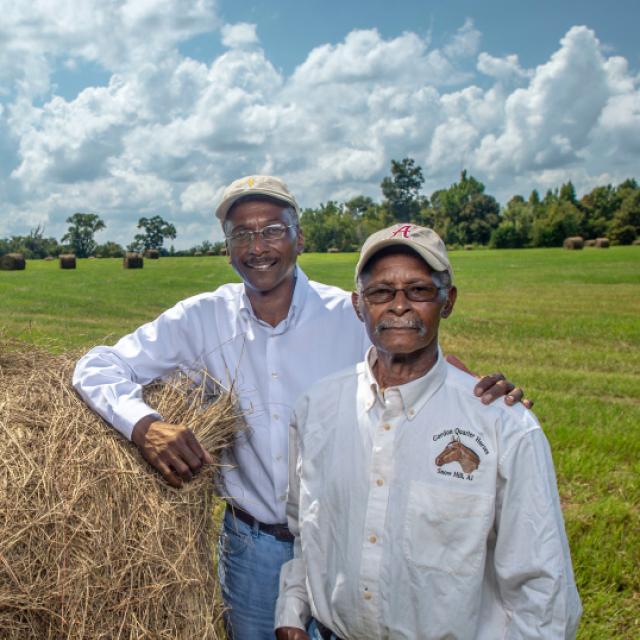
To get started with NRCS, we recommend you stop by your local NRCS field office. We’ll discuss your vision for your land.
NRCS provides landowners with free technical assistance, or advice, for their land. Common technical assistance includes: resource assessment, practice design and resource monitoring. Your conservation planner will help you determine if financial assistance is right for you.
We’ll walk you through the application process. To get started on applying for financial assistance, we’ll work with you:
Once complete, we’ll work with you on the application, or CPA 1200.
Applications for most programs are accepted on a continuous basis, but they’re considered for funding in different ranking periods. Be sure to ask your local NRCS district conservationist about the deadline for the ranking period to ensure you turn in your application in time.
As part of the application process, we’ll check to see if you are eligible. To do this, you’ll need to bring:
If you don’t have a farm number, you can get one from USDA’s Farm Service Agency. Typically, the local FSA office is located in the same building as the local NRCS office. You only need a farm number if you’re interested in financial assistance.
NRCS will take a look at the applications and rank them according to local resource concerns, the amount of conservation benefits the work will provide and the needs of applicants. View Application Ranking Dates by State.
If you’re selected, you can choose whether to sign the contract for the work to be done.
Once you sign the contract, you’ll be provided standards and specifications for completing the practice or practices, and then you will have a specified amount of time to implement. Once the work is implemented and inspected, you’ll be paid the rate of compensation for the work if it meets NRCS standards and specifications.